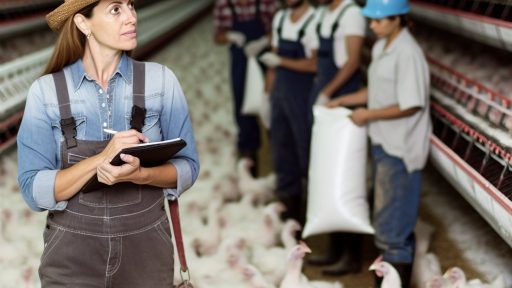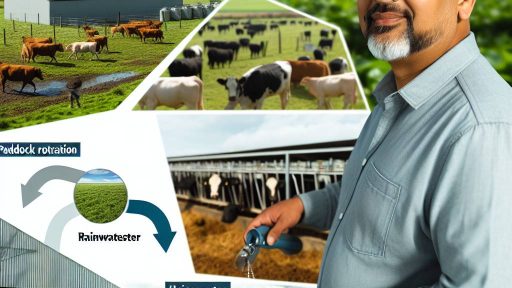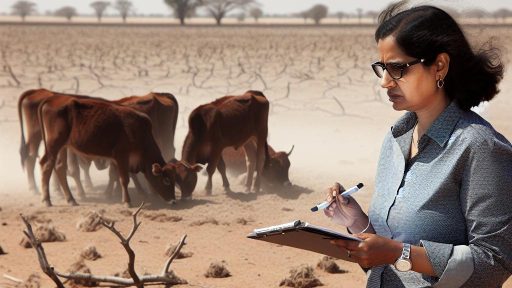Understanding Stressors in Commercial Swine Farming
Common Sources of Stress
Commercial swine farming poses several stressors for pigs.
Environmental conditions significantly impact animal welfare.
Temperature extremes can lead to severe stress reactions.
Humidity levels also influence the overall comfort of pigs.
Additionally, overcrowding creates competition for space and resources.
Social interactions among pigs sometimes lead to aggression.
Furthermore, handling practices can cause undue stress.
Transportation and loading processes frequently exacerbate this issue.
Physiological Effects of Stress
Stress triggers various physiological changes in swine.
Cortisol production increases in response to stressful situations.
Elevated cortisol can impair immune function significantly.
Moreover, it affects growth rates and reproductive performance.
Chronic stress can lead to behavioral issues in pigs.
Animals may exhibit signs of anxiety and fearfulness.
Environmental and Management Factors
Proper environmental management mitigates stress levels effectively.
Transform Your Agribusiness
Unlock your farm's potential with expert advice tailored to your needs. Get actionable steps that drive real results.
Get StartedVentilation systems must maintain optimal air quality.
Furthermore, access to clean water and nutritious food is essential.
Regular health checks help identify issues before they escalate.
Behavioral enrichment enhances pigs’ quality of life.
Integrating natural elements into housing can promote well-being.
Best Practices for Stress Reduction
Implementing best practices aids in reducing stressors effectively.
Using low-stress handling techniques is crucial.
Routine training for workers ensures they understand animal care.
Gradual acclimatization to human interaction fosters trust.
Additionally, maintaining a consistent routine helps reduce anxiety.
Regularly evaluating the facility and animal health enhances overall welfare.
Collaboration with veterinarians ensures best practices are followed.
Importance of Animal Welfare in Reducing Stress
Understanding Animal Welfare
Animal welfare directly influences the health and productivity of livestock.
Healthy animals produce better quality products for consumers.
Moreover, poor welfare can lead to stress and susceptibility to disease.
Benefits of Prioritizing Welfare
Prioritizing animal welfare results in lower stress levels among pigs.
This approach enhances growth rates and reproductive efficiency.
Consequently, farmers experience increased profitability.
Environmental Enrichment
Providing environmental enrichment can significantly boost animal welfare.
Enrichment reduces boredom and allows pigs to express natural behaviors.
Examples include providing toys, rooting materials, and adequate space.
Proper Handling Techniques
Employing proper handling techniques minimizes stress during routine management.
Handlers should be trained to work calmly and gently with animals.
Furthermore, using low-stress livestock handling methods is beneficial.
Showcase Your Farming Business
Publish your professional farming services profile on our blog for a one-time fee of $200 and reach a dedicated audience of farmers and agribusiness owners.
Publish Your ProfileMonitoring and Assessment
Regular monitoring of animal health and behavior helps identify welfare issues.
Farmers should observe pigs for signs of stress or discomfort.
Consequently, timely interventions can be made to alleviate stressors.
The Role of Nutrition
Providing balanced nutrition is essential for reducing stress in pigs.
A well-formulated diet supports overall health and well-being.
Good nutrition can also enhance immune function, reducing disease risk.
Implementing Proper Housing and Space Requirements
Importance of Adequate Space
Providing enough space is vital for swine health.
When pigs have room to move, they tend to exhibit less stress.
Research shows crowded conditions lead to aggression and injuries.
In contrast, spacious environments promote normal behaviors.
Designing Comfortable Housing
Comfortable housing affects pig welfare significantly.
Ensure proper ventilation to maintain air quality.
Humidity control is necessary to prevent respiratory issues.
Moreover, temperature regulation protects pigs from heat stress.
Utilizing Natural Elements
Incorporating natural elements benefits pig well-being.
Use straw bedding to enhance comfort and reduce stress.
Additionally, create spaces for shade and shelter.
Access to outdoor areas encourages exploration and socialization.
Implementing Enrichment Strategies
Enrichment helps stimulate pigs mentally and physically.
Introduce toys or materials for pigs to engage with.
For instance, ropes, balls, and wood blocks can serve this purpose.
As a result, pigs exhibit fewer signs of boredom and frustration.
Monitoring Social Dynamics
Understanding group dynamics can minimize stress levels.
Keep tabs on how pigs interact within their space.
Identify dominant individuals to prevent bullying or aggression.
Creating smaller groups can help maintain harmony.
Regular Assessment and Adaptation
Continual assessment of housing conditions is essential.
Adapt space based on the specific needs of the pigs.
Regularly evaluate group sizes and housing configurations.
Stay informed about advancements in swine housing practices.
Find Out More: Beekeeping Tips for Preventing Colony Collapse Disorder
Nutrition and Feeding Strategies to Minimize Stress
Importance of Balanced Nutrition
Balanced nutrition plays a vital role in swine health.
It helps improve the immune system and reduces stress.
Providing pigs with adequate nutrients is essential.
Quality feed enhances growth and overall well-being.
Types of Feed and Their Benefits
There are several feed options for swine.
Each type has unique benefits worth considering.
- Pelleted feed is easy to digest.
- Grain-based diets can improve energy levels.
- High-fiber feeds enhance gut health.
Feeding Frequency and Schedule
Regular feeding schedules reduce stress in pigs.
This routine helps create a sense of security.
Consider feeding smaller, more frequent meals.
Showcase Your Farming Business
Publish your professional farming services profile on our blog for a one-time fee of $200 and reach a dedicated audience of farmers and agribusiness owners.
Publish Your ProfileThis approach can promote better digestion.
Water Availability and Quality
Water is as crucial as food in pig nutrition.
Access to clean, fresh water minimizes stress.
Ensure that water is readily available at all times.
Regularly check water sources for contamination.
Mineral and Vitamin Supplements
Sometimes, pigs require additional supplements.
Minerals and vitamins play a significant role in health.
Supplementing feeds can help prevent deficiencies.
- Zinc boosts immune function.
- Vitamin E supports muscle development.
- Calcium aids in bone strength.
Monitoring Body Condition
Regularly check pigs for body condition scores.
This practice helps identify nutritional deficiencies.
Adjust rations based on individual needs.
Maintaining a healthy weight helps reduce stress levels.
Incorporating Feed Additives
Feed additives can improve nutrient absorption.
Consider probiotics to enhance gut health.
Enzymes can aid in breaking down nutrients.
Always consult with a nutritionist for guidance.
Uncover the Details: Organic Livestock Farming for Regenerative Practices
Health Management Practices for Stress Reduction
Implement Regular Health Checks
Regular health checks keep pigs healthy and reduce stress levels.
Use a systematic approach for veterinary visits to monitor health.
Early detection of health issues minimizes the impact on animals.
Work closely with a veterinary team to establish a health program.
Vaccination Protocols
Vaccination is essential for preventing diseases in swine.
Develop a comprehensive vaccination schedule for all animals.
Timely vaccinations lower instances of disease-related stress.
Monitor responses to vaccines and adjust protocols as necessary.
Nutrition and Feeding Practices
Provide balanced nutrition to support overall health.
Incorporate quality feed that meets the specific needs of swine.
Regular feeding schedules contribute to digestive health and stability.
Adequate hydration is crucial for optimal performance and stress reduction.
Environmental Management
Ensure pigs have a comfortable, clean living environment.
Maintain appropriate temperature and ventilation in housing units.
Regularly clean facilities to prevent disease and parasites.
Adequate space allows pigs to move freely and reduces aggression.
Behavioral Enrichment
Introduce enrichment tools to stimulate natural behaviors in pigs.
Examples include toys, rooting boxes, and varied bedding materials.
Enrichment opportunities reduce boredom and related stress behaviors.
Regularly assess the effectiveness of enrichment strategies.
Handling and Socialization Techniques
Use low-stress handling methods when interacting with pigs.
Train staff on appropriate techniques to minimize fear responses.
Create a stable social structure to reduce bullying and stress.
Showcase Your Farming Business
Publish your professional farming services profile on our blog for a one-time fee of $200 and reach a dedicated audience of farmers and agribusiness owners.
Publish Your ProfileObserve social interactions and intervene when necessary.
Monitoring Mental Health
Pay attention to behavioral signs of stress in pigs.
Monitor changes in eating habits and social dynamics.
Implement strategies to address any identified mental health issues.
Regularly review stress management practices for effectiveness.
See Related Content: Grazing Systems for Improving Forage Growth and Soil Fertility
Behavioral Enrichment Techniques to Enhance Wellbeing
Importance of Behavioral Enrichment
Behavioral enrichment significantly improves the quality of life for commercial swine.
It reduces stress and promotes natural behaviors among pigs.
Implementing these techniques can lead to healthier and more productive animals.
Types of Behavioral Enrichment Techniques
- Physical enrichment includes toys and structures for pigs to explore.
- Social enrichment allows pigs to interact with each other.
- Environmental enrichment involves altering their living space regularly.
Physical Enrichment Ideas
Providing objects like balls or ropes stimulates curiosity.
Obstacle courses encourage exercise and mental engagement.
Additionally, different textures can be introduced for pigs to investigate.
Social Enrichment Strategies
Keeping pigs in groups allows for natural social behaviors.
Consider rotating companions to prevent boredom and aggression.
Observation can reveal how social interaction positively impacts behavior.
Environmental Enrichment Techniques
Change the layout of the living area periodically.
Introduce scents or food puzzles to stimulate exploration.
Rotating bedding materials can provide new experiences for pigs.
Monitoring Outcomes
Regularly assessing pig behavior is crucial for effective enrichment.
Watch for signs of stress or boredom to adapt strategies accordingly.
Engagement levels should improve as new enrichment is introduced.
Proactive Approach for Enhanced Wellbeing
Implementing behavioral enrichment techniques enhances the wellbeing of swine.
This proactive approach leads to reduced stress and increased productivity.
Consequently, a more humane farming system can be achieved.
Discover More: Pasture Rotation Strategies for Sustainable Livestock Farming

The Role of Stockmanship in Stress Reduction
Understanding Stockmanship
Stockmanship refers to the expert handling of livestock.
It involves understanding animal behavior and needs.
Good stockmanship creates a calm environment for pigs.
Moreover, it fosters trust between farmers and animals.
Key Techniques for Effective Stockmanship
One technique is proper handling practices.
Farmers should always approach pigs calmly and quietly.
Additionally, using low-stress moving techniques reduces anxiety.
Moving pigs in small groups is often more effective.
Another technique focuses on familiarity.
Pigs become stressed in unfamiliar situations.
Therefore, maintaining a consistent routine is essential.
Regular interaction with pigs promotes familiarity and comfort.
The Impact of Environment
The environment significantly influences pig stress levels.
A clean, spacious barn helps reduce stress.
Adding enrichment items can also help pigs feel secure.
Showcase Your Farming Business
Publish your professional farming services profile on our blog for a one-time fee of $200 and reach a dedicated audience of farmers and agribusiness owners.
Publish Your ProfileFor instance, toys and bedding provide mental stimulation.
Training and Knowledge Development
Training staff in animal behavior is crucial.
Knowledgeable workers can better identify stress signals.
Furthermore, ongoing education fosters optimal handling techniques.
Investing in training pays off in healthier pigs.
Monitoring Stress Levels
Regular observation aids in detecting stress early.
Farmers should look for changes in eating habits or social interactions.
Additionally, keeping records can identify patterns of stress.
This proactive approach allows for timely interventions.
Monitoring and Assessing Stress Levels in Swine
Understanding Stress Indicators
Recognizing stress indicators is crucial in swine farming.
Common signs include changes in behavior and physical appearance.
Pigs may exhibit aggression or withdrawal when stressed.
Monitor their eating habits for indications of stress levels.
Weight loss can also signify underlying stress issues.
Regular Health Assessments
Conduct regular health assessments to effectively monitor stress.
Utilize veterinary services for thorough health evaluations.
Implement routine checks for signs of illness or injury.
Document any irregularities to track trends over time.
Collaboration with a veterinarian enhances overall animal welfare.
Utilizing Technology for Monitoring
Employing technology can streamline stress monitoring processes.
Wearable sensors track physiological responses in real-time.
Data collection can reveal patterns related to stressors.
Utilize cameras to observe animal behavior remotely.
This approach minimizes disturbances and keeps pigs calm.
Environment Management
Assessing the farming environment is essential for reducing stress.
Ensure pigs have adequate space for movement and socializing.
Temperature and ventilation play significant roles in their well-being.
Provide enriching materials for stimulation and comfort.
Regularly evaluate and improve housing conditions as needed.
Implementing Behavioral Observations
Observational studies help assess stress levels more accurately.
Observe interactions among pigs to spot dominance hierarchies.
Frequent monitoring can identify stress triggers quickly.
Record behavioral changes, as they often correlate with stress.
Use this data to develop better management strategies.
Implementing Technology and Innovations for Stress Minimization
Utilizing Smart Farm Technologies
Smart farm technologies enhance monitoring and management in swine farming.
These technologies help reduce stress by providing real-time data.
Furthermore, they support better decision-making processes for farmers.
For instance, automated feeding systems can optimize feed delivery times.
Consequently, pigs receive consistent nutrition, minimizing competition stress.
Incorporating Environmental Control Systems
Advanced environmental control systems improve animal welfare significantly.
Showcase Your Farming Business
Publish your professional farming services profile on our blog for a one-time fee of $200 and reach a dedicated audience of farmers and agribusiness owners.
Publish Your ProfileThese systems help regulate temperature and humidity in pig housing.
Moreover, they contribute to overall health and comfort for the animals.
As a result, pigs experience reduced heat stress during warmer months.
Additionally, quality air circulation systems can lower disease risks.
Exploring Genetic Selection for Stress Resistance
Selective breeding programs focus on stress resilience in swine breeds.
Breeding for stress-resistant traits leads to healthier pigs overall.
Healthy pigs tend to demonstrate better growth rates and reproduction.
By investing in research, farmers can identify key genetic markers.
This strategy ultimately promotes long-term sustainability in farming.
Implementing Behavioral Enrichment Strategies
Behavioral enrichment techniques can significantly reduce stress levels.
Providing adequate space and social interaction is essential.
Additionally, incorporating play items can stimulate natural behaviors.
Studies show that enriched environments lead to happier, healthier pigs.
Consequently, farmers can witness an increase in overall productivity.
Integrating Health Monitoring Devices
Health monitoring devices play a crucial role in stress management.
Wearable technologies offer insights into individual animals’ health statuses.
These devices allow farmers to identify issues before they escalate.
Additionally, timely interventions can minimize stress caused by illness.
Regular health checks through technology create a proactive farming environment.
Additional Resources
Invited review: strategic adoption of antibiotic-free pork production …
Post weaning diarrhea in pigs: risk factors and non-colistin-based …




